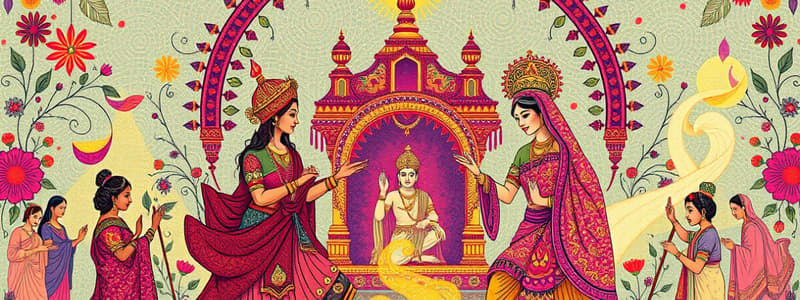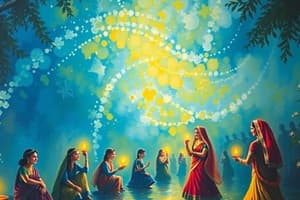Podcast
Questions and Answers
What does Diwali symbolize?
What does Diwali symbolize?
- The arrival of spring
- Harvest celebration
- Victory of light over darkness (correct)
- Communal prayers and charity
Which festival is primarily celebrated by Hindus and involves throwing colored powders?
Which festival is primarily celebrated by Hindus and involves throwing colored powders?
- Holi (correct)
- Pongal
- Diwali
- Eid
Which festival is an important part of the Tamil harvest celebration?
Which festival is an important part of the Tamil harvest celebration?
- Pongal (correct)
- Onam
- Diwali
- Navratri
What does Eid commemorate in the Islamic faith?
What does Eid commemorate in the Islamic faith?
Which religion has the majority of its followers in India?
Which religion has the majority of its followers in India?
What is the major text of the Sikh religion?
What is the major text of the Sikh religion?
Which festival in Kerala is associated with the legendary King Mahabali?
Which festival in Kerala is associated with the legendary King Mahabali?
Which of the following religions originated with Siddhartha Gautama?
Which of the following religions originated with Siddhartha Gautama?
Flashcards are hidden until you start studying
Study Notes
Cultural Festivals
-
Diwali:
- Festival of Lights, celebrated by Hindus, Sikhs, and Jains.
- Symbolizes the victory of light over darkness and good over evil.
- Involves lighting lamps, fireworks, and family gatherings.
-
Holi:
- Festival of Colors, celebrated primarily by Hindus.
- Marks the arrival of spring and the victory of good over evil.
- Involves throwing colored powders and water, singing, and dancing.
-
Eid:
- Celebrated by Muslims, marking the end of Ramadan (Eid al-Fitr) and the willingness to sacrifice (Eid al-Adha).
- Involves communal prayers, feasting, and giving of charity.
-
Pongal:
- Primarily celebrated in Tamil Nadu, marking the harvest season.
- Involves cooking a special dish from newly harvested rice and various festivities.
-
Navratri/Dussehra:
- Celebrates the victory of Goddess Durga over the buffalo demon Mahishasura.
- Nine nights of worship (Navratri) followed by Dussehra, symbolizing the triumph of good.
-
Onam:
- Harvest festival celebrated in Kerala.
- Involves feasting, boat races, and traditional games to welcome the legendary King Mahabali.
Religious Diversity
-
Hinduism:
- The majority religion; characterized by a variety of beliefs and practices.
- Major texts include the Vedas, Upanishads, and epics like the Mahabharata and Ramayana.
-
Islam:
- Second-largest religion; followers are called Muslims.
- Major texts include the Quran and Hadith.
- Significant sects include Sunni and Shia.
-
Christianity:
- Third-largest religion; followers are Christians.
- Major texts include the Bible.
- Various denominations exist, including Catholicism, Protestantism, and Orthodox traditions.
-
Sikhism:
- Founded in the Punjab region in the 15th century by Guru Nanak.
- Key texts include the Guru Granth Sahib.
- Emphasizes equality, service, and devotion to one God.
-
Buddhism:
- Originated in India with the teachings of Siddhartha Gautama (Buddha).
- Focuses on the Four Noble Truths and the Eightfold Path.
- Promotes concepts like karma and rebirth.
-
Jainism:
- Ancient religion emphasizing non-violence (ahimsa) and truth.
- Key texts include the Agamas.
- Followers seek liberation through strict ethical standards and asceticism.
-
Zoroastrianism:
- Small community, primarily in Gujarat (Parsis).
- Founded by Prophet Zoroaster, emphasizes the duality of good and evil.
- Key text is the Avesta.
-
Religious Syncretism:
- Many communities practice a blend of religious traditions.
- Festivals often incorporate elements from multiple religions, reflecting India's pluralistic society.
Cultural Festivals
-
Diwali:
- Known as the Festival of Lights; celebrated by Hindus, Sikhs, and Jains.
- Represents the triumph of light over darkness and good over evil.
- Celebrations include lighting lamps, fireworks, and family gatherings.
-
Holi:
- Celebrated primarily by Hindus as the Festival of Colors.
- Marks the arrival of spring and the victory of good over evil.
- Festivities involve throwing colored powders and water, along with singing and dancing.
-
Eid:
- Marks two major events for Muslims: Eid al-Fitr (end of Ramadan) and Eid al-Adha (sacrifice).
- Celebrations include communal prayers, large feasts, and charitable giving.
-
Pongal:
- A harvest festival primarily observed in Tamil Nadu.
- Features the cooking of a special dish made from newly harvested rice along with local festivities.
-
Navratri/Dussehra:
- Celebrates the victory of Goddess Durga over the buffalo demon Mahishasura.
- Consists of nine nights of worship (Navratri) followed by Dussehra, symbolizing the triumph of good.
-
Onam:
- A harvest festival celebrated in Kerala.
- Involves elaborate feasting, traditional boat races, and games to honor the legendary King Mahabali.
Religious Diversity
-
Hinduism:
- The predominant religion in the region, featuring a wide array of beliefs and practices.
- Major scriptures include the Vedas, Upanishads, and epics like the Mahabharata and Ramayana.
-
Islam:
- The second-largest religion globally; followers are known as Muslims.
- Key texts include the Quran and Hadith, with major sects being Sunni and Shia.
-
Christianity:
- The third-largest religion with followers called Christians.
- Central text is the Bible, encompassing various denominations such as Catholicism, Protestantism, and Orthodox traditions.
-
Sikhism:
- Emerged in the 15th century in the Punjab region, founded by Guru Nanak.
- Key scripture is the Guru Granth Sahib; it emphasizes equality, service, and worship of one God.
-
Buddhism:
- Originated in India through the teachings of Siddhartha Gautama, known as Buddha.
- Centers on the Four Noble Truths and the Eightfold Path, focusing on concepts like karma and rebirth.
-
Jainism:
- An ancient religion prioritizing non-violence (ahimsa) and truth.
- Key texts are the Agamas; followers pursue liberation through strict ethical living and ascetic practices.
-
Zoroastrianism:
- A minority faith, mainly among the Parsis in Gujarat.
- Founded by Prophet Zoroaster; highlights the duality of good and evil, with the Avesta as its key text.
-
Religious Syncretism:
- Reflection of India's pluralistic society where many communities blend different religious traditions.
- Festivals often incorporate elements from various religions, showcasing the diversity of beliefs.
Studying That Suits You
Use AI to generate personalized quizzes and flashcards to suit your learning preferences.




